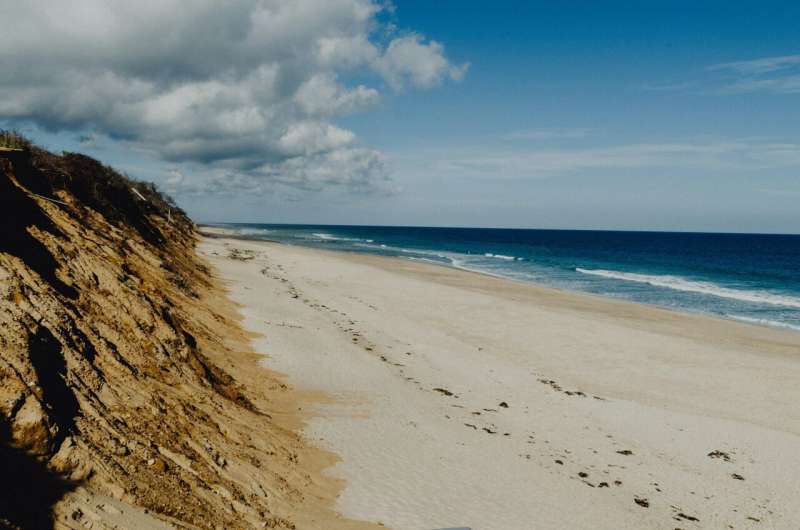This article has been reviewed according to Science X's editorial process and policies. Editors have highlighted the following attributes while ensuring the content's credibility:
fact-checked
reputable news agency
proofread
Cape Cod scientists delay controversial climate change project after feds raise concern

Cape Cod scientists are delaying a geoengineering project that looks to dump more than 60,000 gallons of sodium hydroxide into the ocean and has caught federal concerns around potential impacts on the ecosystem.
Scientists at Woods Hole Oceanographic Institution in Falmouth have pushed back the project from mid-September to next summer because they say a fully-equipped research vessel is no longer available.
Woods Hole's decision to delay became public two days after the National Marine Fisheries published a warning that the project could "adversely affect federally-managed species and other NOAA trust resources."
The experiment, consisting of two phases, would dump sodium hydroxide and freshwater into the Atlantic, temporarily changing the water's chemistry—increasing carbon dioxide levels that the ocean absorbs.
Scientists say it's an effort that could be a way to slow climate change in the long run.
The first phase of the so-called LOC-NESS project, short for "Locking away Ocean Carbon in the Northeast Shelf and Slope," would release 6,600 gallons of sodium hydroxide solution roughly 10 miles south of Normans Land, an island off of Martha's Vineyard.
The release of the solution would occur over two to three hours to "create a patch of alkalinity on the ocean surface and then monitored for up to five days by an on-site scientific research team," according to project documents.
In the second phase, pushed back to 2026, scientists would dump up to 66,000 gallons into the Wilkinson Basin, nearly 40 miles northeast of Provincetown.
Roughly 35 federally managed species have been designated "essential fish habitats" that intersect with the vicinity of the first phase project area, according to the Environmental Protection Agency, which has tentatively determined to issue two research permits.
Woods Hole scientists have said research activities would result in "localized changes in the carbonate chemistry of the surface ocean waters in and surrounding the release location for up to a few days" in the first phase.
But within two minutes of the initial release of the alkaline solution, pH would return to levels within federally recommended water quality standards for saltwater aquatic life, they said.
"The temporary changes in carbonate chemistry may result in localized adverse impacts to the plankton community," scientists outlined in a project document, "but these impacts are not expected to be severe or long-lasting within the environment."
Strict environmental monitoring protocols would be maintained during the endeavor, according to the scientists, who would then constantly examine the alkalinity patch, "using a suite of instruments, sensors, and sampling equipment."
The EPA agrees with Woods Hole's assertion that the project would not harm the ecosystem.
"EPA is not aware of any publication regarding the impacts of short-term increases of pH or alkalinity (less than 1 hour), as is proposed in this research study, on marine animals at any life stage," the agency stated in a June project document.
In a July letter to the EPA, the National Marine Fisheries Service disagreed, raising sharp concerns on potential impacts.
"Although the spatial and temporal scale is relatively small," the letter states, "the proposed experiment has the potential to injure or kill all life stages of federally-managed species (especially planktonic egg and larval stages) that may occur in the action area during the first few minutes after the NaOH deployment."
Woods Hole emphasized in a release how the proposal has "received significant support from leading scientists, top academic institutions, and environmental advocacy organizations."
Despite the support, the institution said the research vessel it planned to use in the first phase is no longer available, and a replacement wouldn't be ready until late September, when "additional delays" could arise due to the "active hurricane season."
"We are dedicated to getting the science right," said Adam Subhas, an associate scientist in marine chemistry and geochemistry at Woods Hole who is leading the project.
"Our trial aims to expand our understanding of the effectiveness and potential environmental impacts of ocean alkalinity enhancement, and that requires the right equipment operating under the proper conditions."
Environmentalists and fishermen have not taken kindly to the proposed experiment.
Friends of the Earth, one of the dozens of groups that wrote to the EPA against the project, highlighted how ocean alkalinity enhancement is "under moratoria under the United Nations Convention on Biological Diversity due to the risks and uncertainties that these technologies entail to biodiversity and ecosystems."
"It's heartening that the National Marine Fisheries Service recognizes the many dangers geoengineering poses to ocean ecology and marine life," Friends of the Earth's senior campaigner for climate and energy justice, Benjamin Day, said in a statement.
"It would be unconscionable and irresponsible for any agency to greenlight the dumping of thousands of gallons of a caustic substance into our oceans."
Fishermen across the region highlighted in letters to the EPA how they believe the experiment could affect their operations, with one saying a targeted area for testing has produced 30% to 40% of his catch.
Jerry Leeman, CEO and founder of the New England Fishermen's Stewardship Association, said he felt the "project is being done in haste and without proper oversight."
"Major impacts to the commercial and recreational fisheries are likely," he wrote, "which would cause severe economic turmoil (and loss of commercial and recreation opportunities) to the neighboring states' fisheries, in addition to the immediate test site."
2024 MediaNews Group, Inc. Distributed by Tribune Content Agency, LLC.



















